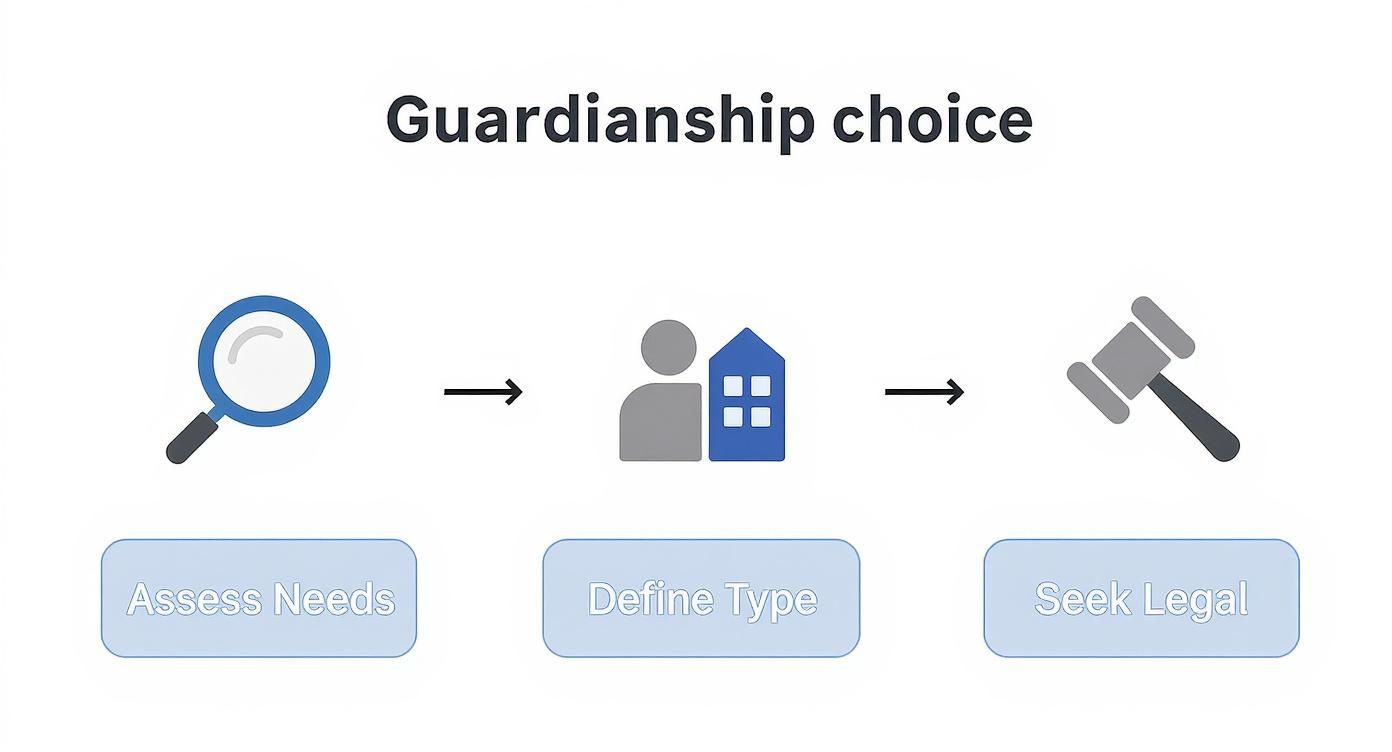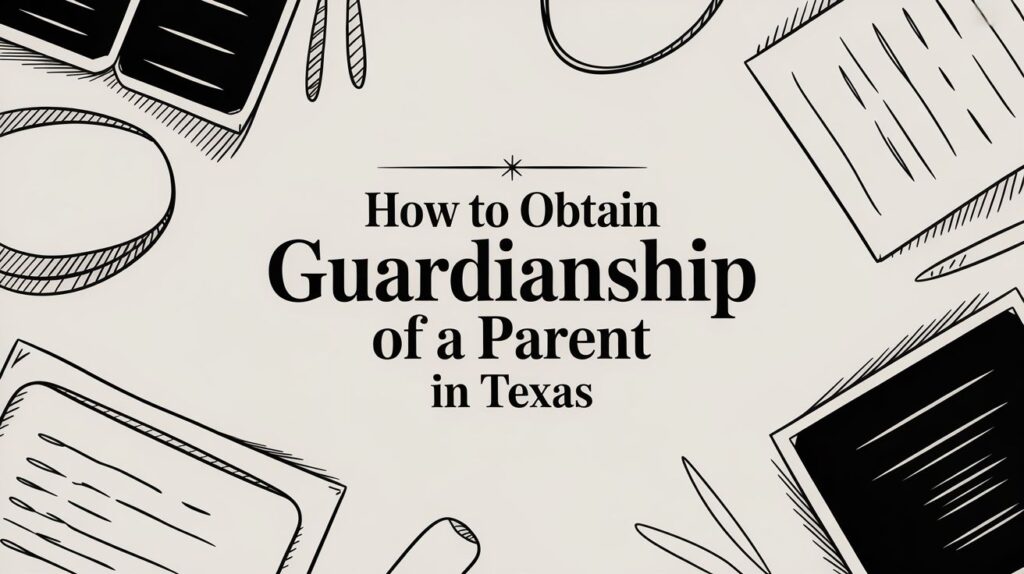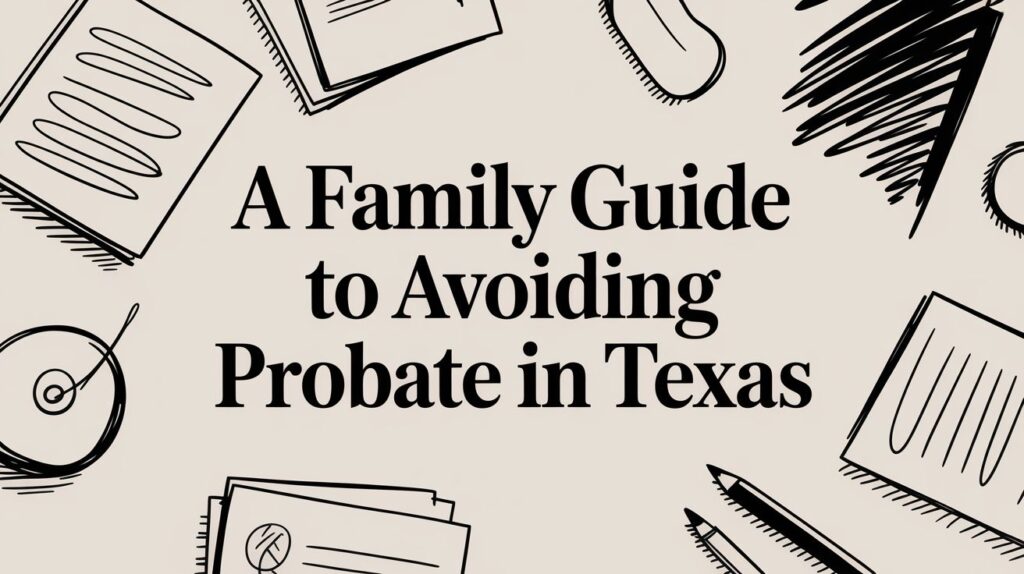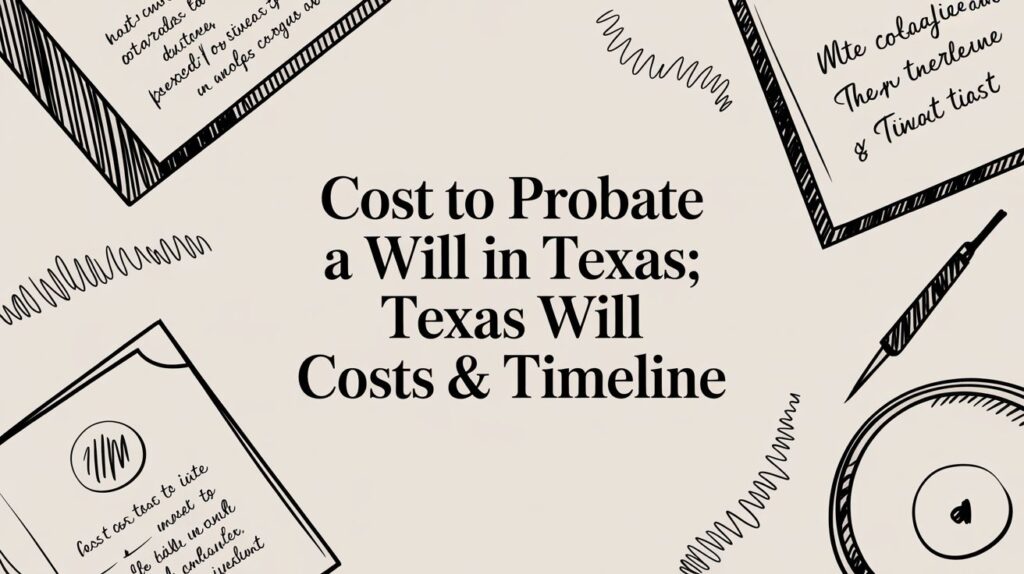Obtaining guardianship of a parent in Texas is a significant legal step taken out of love and concern. It requires you to prove to a court that your parent is legally "incapacitated"—a term from the Texas Estates Code meaning they can no longer safely manage their own personal or financial affairs. This process isn't about taking control; it's a protective measure for a vulnerable parent. It involves filing a formal application, presenting clear medical evidence, and demonstrating to the court that guardianship is the least restrictive option available to ensure their safety and well-being.
Knowing When Guardianship Is the Right Choice
Deciding to pursue guardianship for a parent is one of the most heart-wrenching choices an adult child will ever make. It's a step filled with emotion, often taken after months or even years of mounting worry. The core issue isn’t just that Mom or Dad needs a helping hand; it’s whether they have lost the legal capacity to care for themselves—a condition the Texas Estates Code calls “incapacity.”
This legal line is crossed when a parent can no longer provide for their own food, clothing, or shelter, manage their finances, or make sound decisions about their physical health. This is a huge leap from simply being forgetful or making a few questionable choices.
Distinguishing Need from Incapacity
Many aging parents need help with daily tasks, but that alone doesn't mean they need a guardian. The critical question is whether their decision-making is so impaired that they are a danger to themselves. A key indicator can be their ability to handle their own healthcare; understanding the complexities of effective medication management for seniors is often one of the first things to go.
Here's a realistic scenario we often see with Texas families:
An elderly father, James, is living alone with early-stage dementia. His daughter, Sarah, notices he’s losing weight and finds unopened bills piling up on his desk. When she checks his pill organizer, she sees he has missed several doses of his crucial heart medication. The final straw comes when his bank calls about a large, suspicious wire transfer to an unknown "charity."
In this situation, James isn't just being forgetful. He is fundamentally unable to manage his health and finances, leaving him wide open to harm and exploitation. His actions show a clear lack of capacity, making guardianship a necessary shield.
Understanding Guardianship's Scope in Texas
Guardianship isn't a one-size-fits-all solution. Texas courts work hard to tailor the guardian's powers to the individual's specific needs, preserving as much of their independence as possible.
To give you a better idea, here’s a breakdown of the primary types of guardianship you might encounter.
Types of Guardianship in Texas
| Type of Guardianship | What It Covers (Plain English) | When It's Needed |
|---|---|---|
| Guardian of the Person | Decisions about physical well-being: where they live, what medical care they get, and daily activities. | When a parent can no longer make safe decisions about their health, housing, or personal care. |
| Guardian of the Estate | Management of all financial affairs: paying bills, managing investments, and protecting assets from fraud. | When a parent is unable to handle their finances, making them vulnerable to scams or mismanagement. |
| Full Guardianship | Combines the duties of both Guardian of the Person and Guardian of the Estate. | When a parent is completely incapacitated and unable to make decisions about their health and their finances. |
| Temporary Guardianship | A short-term appointment (usually 60 days) to handle an immediate crisis. | In an emergency, like a sudden medical event or an immediate threat of financial exploitation. |
In many cases, the court will appoint one person to serve as both Guardian of the Person and Guardian of the Estate. The parent under guardianship is then legally known as the "ward." You can learn more about the rights and protections involved by reading our article on what a ward of the state is in our detailed article.
This is a significant legal step. An estimated 1.3 million adults in the U.S. live under some form of guardianship, with guardians controlling roughly $50 billion in assets. It's a system designed for protection, and the court takes its responsibility very seriously.
Navigating the Texas Guardianship Legal Process
Once you’ve decided that guardianship is the only way forward to protect your parent, the legal road ahead can feel overwhelming. Facing the Texas court system, especially during such an emotional time, is a challenge. But understanding the key stages can turn a confusing process into a clear, predictable path, empowering you to advocate for your parent with confidence.
The journey officially kicks off when your attorney files an Application for Appointment of a Permanent Guardian with the court. This isn't just another form; it's a sworn legal document that serves as the foundation for your entire case. The Texas Estates Code is very specific about what it must contain—your parent's information, the reasons guardianship is necessary, and exactly what kind of authority you're asking for. Getting this right from the start is critical, as any mistakes or missing details can cause serious delays.
The Role of the Attorney Ad Litem
After the application is on file, the court will appoint an attorney ad litem. In plain English, this person is your parent's own independent lawyer. Their only job is to represent your parent's best interests—not yours, and not the court's. They are a neutral party meant to ensure your parent's rights are protected.
The attorney ad litem will then start their own investigation. This usually involves:
- Meeting your parent in person: They'll sit down with your parent to explain what's happening and understand their wishes and mental state.
- Interviewing you and other family: They need to understand the family dynamics and why you believe guardianship is the answer.
- Reviewing medical records: This is where they form an independent opinion on your parent’s actual level of incapacity.
- Speaking with doctors and caregivers: Talking to the people who see your parent every day gives them the full picture of their life and needs.
This whole process gives the court an unbiased perspective before it makes a decision that will change your parent's life forever.
The Critical Medical Examination
Probably the single most important piece of evidence in your case is the Certificate of Medical Examination (CME). Texas law is strict on this: a physician must examine your parent within 120 days of the guardianship hearing.
This isn't a simple check-up. The doctor has to fill out a specific, court-approved form detailing the nature, degree, and severity of your parent's incapacity. This document is the medical backbone of your case, providing the objective proof the court needs.
The following graphic gives you a visual of how these initial steps flow together.

As you can see, a successful guardianship starts with a careful assessment of the situation before you ever step foot in a courthouse.
The Guardianship Hearing
Everything culminates in the court hearing. This is where a judge will review all the evidence, listen to testimony, and make a final decision. Your parent has the right to be there and can even contest the guardianship if they disagree with it.
As the person applying, you have to prove your parent's incapacity by "clear and convincing evidence." This is a high legal bar to clear. It means the judge has to have a firm belief that what you're presenting is true. Be ready to answer tough questions about your parent's condition and why you're the right person to serve as their guardian.
The entire Texas Probate Process is built to protect vulnerable people. Whether you're seeking a Guardianship or navigating Wills & Trusts, the court's primary goal is to make sure the proposed ward’s rights are fiercely defended. In some families, disagreements can escalate into full-blown Probate Litigation, which makes having an experienced lawyer in your corner even more vital.
Key Insight
The Certificate of Medical Examination (CME) is the medical backbone of your case. A vague or incomplete report from a physician can completely derail a guardianship application. It's essential the doctor provides a clear, detailed assessment of your parent's inability to manage their own health, safety, and financial affairs, as required by the Texas Estates Code.
Gathering the Evidence for Your Guardianship Case

To convince a judge that guardianship is necessary, you have to do more than just tell them your parent needs help. You have to show them. This means building a strong, clear, and compelling case based on objective facts—not just accusations or worries.
The court is being asked to make a life-altering decision, so your job is to give them all the information they need. Your case will stand on two pillars: medical evidence and non-medical evidence. Both are absolutely critical to painting a complete and honest picture of the situation.
The Power of Medical Documentation
Medical evidence is the clinical proof of incapacity the court is looking for. We’ve already touched on the Certificate of Medical Examination (CME), which is the single most important document you’ll file. But don’t stop there.
Think of the CME as the headline; supporting medical records provide the full story. You can add powerful context by including things like:
- Physician’s notes that track cognitive decline over several visits.
- Test results from neurological exams or memory screenings.
- Records from hospitalizations or ER visits due to falls, confusion, or medication mix-ups.
This kind of documentation turns the CME from a one-time snapshot into a detailed narrative of your parent's declining ability to care for themselves. It gives the judge a solid, fact-based understanding of why a guardian is medically necessary.
Painting the Full Picture with Non-Medical Evidence
While doctors provide the diagnosis, it's the day-to-day realities of your parent's life that provide the human context. This non-medical evidence is just as important because it shows the real-world consequences of their incapacity.
Let’s look at a common scenario. A daughter, Maria, is seeking guardianship of her father, David. Along with his medical records showing advancing Alzheimer's, she puts together a folder containing:
- Copies of past-due bills and utility shut-off notices.
- Photos of an empty refrigerator and expired food in the pantry.
- Emails from concerned neighbors who found David wandering down the street, lost and disoriented.
- A written statement from his in-home caregiver detailing missed doctor's appointments and his refusal to take medication.
Every one of these items directly supports the claim that David can no longer manage his personal safety or his finances. It shows the court the tangible, everyday risks he faces. Knowing how to present these firsthand accounts can be tricky, but looking over a sample of a legal guardianship letter can give you a good idea of what courts find persuasive.
Proving Your Own Suitability to Serve
Finally, gathering evidence isn't just about your parent—it's also about you. The court has to be convinced that you are the right person for this immense responsibility. As the one asking to be guardian, you will need to:
- Pass a criminal background check to show you have no history that would disqualify you.
- Demonstrate financial stability and responsibility, especially if you’re asking to be Guardian of the Estate.
- Provide information about your own life that proves you have the ability to manage a guardian's duties.
Key Insight
The court's primary duty is to protect the proposed ward. Proving your parent’s incapacity is only half the battle. You must also prove, with equal clarity, that you are a trustworthy, capable, and dedicated advocate who will always act in their best interest, a standard reinforced throughout the Texas Estates Code.
Your Responsibilities After Being Appointed Guardian
When the judge finally signs the court order, it's easy to breathe a sigh of relief. You made it through the process. But in the eyes of the law, this moment isn’t the finish line—it’s the official start of your profound legal and ethical duties. Becoming a guardian is a serious commitment, and from this point forward, the court will hold you accountable for every single decision you make on your parent’s behalf.
Your first official acts as a guardian have a tight deadline. These initial steps are required by the Texas Estates Code to formalize your role and, most importantly, protect your parent, who is now officially the court's "ward."
Within 20 days of your appointment, you must complete these steps:
- Take an Oath: You’ll swear an oath, usually before a notary or the court clerk, promising to faithfully carry out all the duties of a guardian.
- Post a Bond: If you were appointed Guardian of the Estate, the court will almost certainly require you to purchase a surety bond. This is an insurance policy that protects your parent’s assets from any accidental mismanagement on your part.
- File Everything with the Court: Once the oath is signed and the bond is secured, you must file both with the court. After they are approved, the court will issue your official Letters of Guardianship.
That last document—the Letters of Guardianship—is your proof of authority. You’ll need it to show doctors, bankers, and anyone else involved in managing your parent's life and finances.
Ongoing Duties and Court Reporting
Your responsibilities are continuous and will generally fall into two main categories, mirroring the types of Guardianship the court granted.
A Guardian of the Person is in charge of crucial life-care decisions. Where will your parent live? What medical treatments will they receive? Your job is to ensure they are safe, comfortable, and well-cared for. This can be especially important in long-term care settings, where you’ll need to stay on top of things like nursing home infection control to protect their health.
A Guardian of the Estate, on the other hand, has a strict fiduciary duty—a legal term for the highest standard of care—to manage your parent’s finances. You absolutely cannot mix their money with yours or use their assets for your own benefit. The court demands complete transparency.
A Real-World Example of Financial Duties
Let's imagine a man named Tom, who was just appointed Guardian of the Estate for his mother, Susan, who has Alzheimer's. One of his very first tasks is to file a detailed Inventory, Appraisement, and Claim with the court. He has just 30 days from receiving his Letters of Guardianship to get this done. This document is a comprehensive list of every single one of Susan's assets—from her house and car down to her checking account balance and her wedding ring.
But that's just the start. Every year, Tom has to file an Annual Account. This is a detailed report showing all the money that came into Susan’s estate and every penny that went out. He must include receipts and bank statements to show that all expenditures were for his mother's direct benefit—things like her mortgage payments, medical bills, and caregiver salaries.
This strict reporting is designed to protect Susan's assets from being exploited. It’s a core principle of accountability that runs through the entire Texas Probate Process.
Key Insight
Guardianship isn't an informal family arrangement. It is a formal, court-supervised role. The court is the ultimate protector of your parent, and you are its appointed agent, required to report back regularly and transparently under the strict guidelines of the Texas Estates Code.
Overcoming Common Challenges in Guardianship Cases
The path to getting guardianship of a parent is rarely a straight line. It's often filled with emotional and legal hurdles that feel deeply personal and, frankly, exhausting. If you can prepare for these potential roadblocks ahead of time, you'll be in a much better position to navigate them with confidence and compassion.
One of the toughest situations is when a parent objects to the guardianship. It can be heartbreaking. Even with clear evidence of their incapacity, it’s their fundamental right to disagree. In these cases, their court-appointed attorney ad litem has a duty to vigorously fight for their stated wishes. This forces the court into the difficult position of weighing their desire for independence against the evidence of their vulnerability.
When Family Disagrees
Family conflict is another common and painful hurdle. Siblings might disagree on whether guardianship is even necessary, or they might argue over who is best suited to take on the role. These disputes can fracture family bonds and, more importantly, delay the protection your parent urgently needs. When communication breaks down, the court has no choice but to step in and make the decision for you.
To sort it out, the judge will look at several factors:
- Which sibling has been the primary caregiver up to this point?
- Who lives closest and is most available to manage day-to-day needs?
- Is there any history of conflicts of interest or financial mismanagement?
If the conflict is so severe that no single sibling is a clear choice, the court might appoint a neutral, third-party professional to serve as guardian instead. When family disputes get intense, it's crucial to understand your options for how to contest a guardianship in Texas probate court. Knowing the rules can provide essential clarity.
Navigating Pre-Existing Legal Documents
Things can get even more complicated if your parent already has a Power of Attorney (POA) in place. If the person named as the agent in the POA is doing a good job, a guardianship might not be necessary at all.
But what if that agent isn't acting in your parent’s best interest—or is the one causing the harm? In that scenario, the guardianship process will also involve asking the court to revoke the POA, adding another layer to the legal battle.
Key Insight
Guardianship decisions are deeply influenced by complex family dynamics and must always prioritize the vulnerable person's best interests. The court's primary goal is to find the most stable, protective solution, even if it means navigating painful family disagreements or overriding existing documents like a Power of Attorney.
Facing these challenges is emotionally taxing, but you don't have to do it alone. These are common struggles in the Guardianship process, and an experienced attorney can help protect your parent while guiding your family toward a resolution.
Common Questions About the Guardianship Process
Stepping into the world of guardianship for a parent brings up a lot of questions. It's completely normal to feel a bit overwhelmed. Getting clear answers is the first step toward reducing that anxiety and getting prepared for the road ahead.
Here are some of the most common questions we hear from families across Texas who are in your shoes.
How Long Does This Whole Process Take?
There's no single, set timeline, but a realistic estimate for an uncontested guardianship is anywhere from two to four months. That’s from the day you file the application to the day the judge officially appoints a guardian.
This window gives the court enough time to appoint an attorney ad litem, for that attorney to do their investigation, and for all the necessary medical exams to be completed and filed with the court.
Now, if the guardianship is contested—meaning your parent or another family member objects—the process can drag on much longer. Contested cases require additional hearings to sort out the disputes, which adds significant time to the calendar.
What’s the Difference Between Guardianship and a Power of Attorney?
This is a big one, and it boils down to timing and capacity. A Power of Attorney (POA) is a proactive planning tool. Your parent signs it while they still have full mental capacity, giving a trusted person (the "agent") the authority to act for them.
Guardianship, on the other hand, is a reactive court process. It only comes into play after a person has already lost the capacity to make their own decisions.
A valid, well-drafted POA can often eliminate the need for a Guardianship altogether. But if the agent named in the POA isn't acting in your parent's best interest or is abusing their power, the court may still need to step in and establish a guardianship to protect them.
Can More Than One Person Be a Guardian?
Yes, Texas law allows for co-guardians. We see this most often when two adult siblings want to share the responsibility of caring for a parent.
While this can work well and foster collaboration, it’s absolutely crucial that the co-guardians can communicate effectively and make decisions together. If co-guardians constantly disagree, it can lead to a stalemate that hurts your parent. When that happens, the court may have to get involved again through Probate Litigation to resolve the gridlock.
How Much Is This Going to Cost?
The costs can vary dramatically depending on how complex and contentious the case becomes. You should budget for several key expenses:
- Court Filing Fees: These are the standard administrative costs just to open a case with the court.
- Attorney Fees: This includes fees for your own lawyer as well as the court-appointed attorney ad litem who represents your parent's interests.
- Bond Premium: If you are appointed Guardian of the Estate, you'll likely need to pay an annual premium for a bond, which is a type of insurance policy that protects the estate's assets.
A straightforward, uncontested case will always be far less expensive than a contested one that requires multiple court appearances and extensive legal work.
If you’re facing probate in Texas, our team can help guide you through every step — from filing to final distribution. Schedule your free consultation today.







